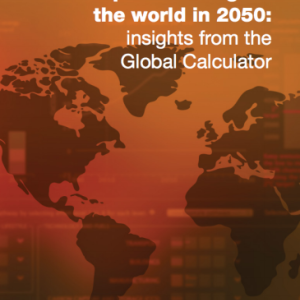
The UK’s Department of Energy and Climate Change has published a report based on their newly developed Global Calculator tool.
The Global Calculator is a model of the world's energy, land and food systems that allows users to explore the options for reducing global emissions to 2050, and to see the climate consequences of these choices to 2100.
It is a free, interactive and open-source tool that helps you to understand the link between our lifestyle, the energy we use, and the consequences for our climate.
In this report DECC use the tool to explore four development pathways to 2050 all of which assume a global population of 10 billion and the limiting of a global temperature increase to 2˚C.
These pathways show that:
- It is physically possible that all 10 billion people in the world could eat well, travel more and live in more comfortable homes, whilst at the same time reducing emissions to a level consistent with a 50% chance of 2°C warming.
- But to do so, we need to transform the technologies and fuels we use. For example, the amount of CO2 emitted per unit of electricity globally needs to fall by at least 90% by 2050. Also, the proportion of households that heat their homes using electric or zero-carbon sources should rise from 5% today to 25-50% globally by 2050.
- We also need to make smarter use of our limited land resources. In particular, we must protect and expand our forests globally by around 5-15% by 2050 because forests act as a valuable carbon sink.
The report looks at what lifestyles might look like (including personal travel and home heating), technologies and fuels, and land use and diets under these scenarios.
It says we need to curb deforestation and indeed increase the area of natural forest by 10-15%. It also says we need to improve livestock management. Finally it makes a point of saying that we need to curb our consumption particularly of beef but ideally of all meat types. The relevant paragraphs, copied, are as follows:
Switching away from beef consumption, towards more poultry, pork, vegetables and grains can also significantly reduce the amount of land required to produce food. For example, currently an area the size of a football pitch can be used to produce 250 kg of beef, 1,000 kg of poultry (both fed on grains and residues) or 15,000 kg of fruit and vegetables.
Decreasing the amount of meat in the global average diet would also have benefits for our climate and human health. In 2050, if everyone switched to the healthy diet as recommended by the World Health Organisation (2,100 calories on average, of which 160 calories is meat), this could save up to 15 GtCO2e in 205011 as the freed up land is used for forest or bioenergy. This carbon saving could be comparable in scale to around a third of total global CO2 emissions in 2011.
Finally the report argues that the potential conflict between land for food and for bioenergy is not inevitable and with better management, we could meet our need for food, protect forests and obtain 15-20% of our primary energy requirements from bioenergy by 2050.
You can read the full report here and see further coverage, including blog-post and comment, on the Eating Better website here. Media coverage can also be found from Daily Mail, Daily Telegraph, and the Guardian.







Post a new comment »